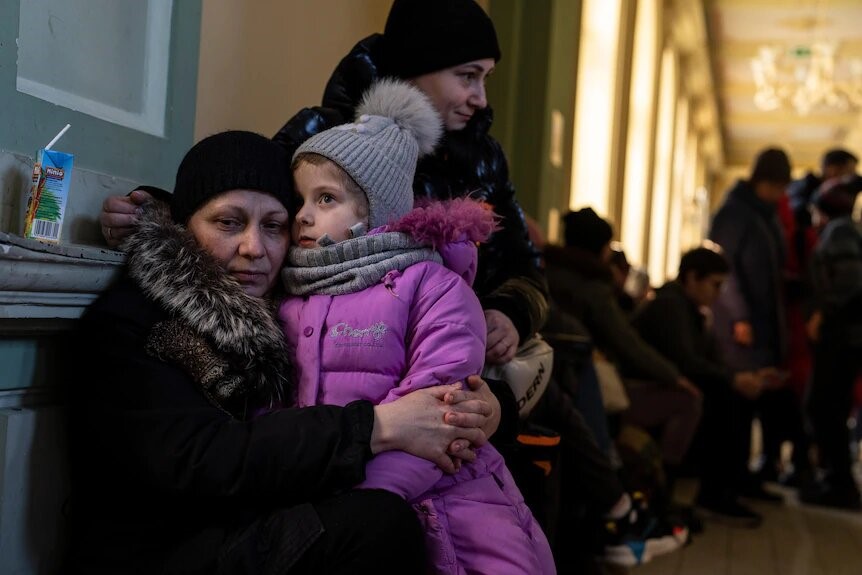by Letizia Di Donato
The Russian-Ukranian war, which started in February 2022, caused a significant humanitarian crisis. While men between the age of 18 and 60 have been called as reservists, women and children are those who are escaping the conflict. They are in a vulnerable position and the risk of being victims of human trafficking increases. During the transit through neighbouring countries, women and children may come across unlawful groups, traffickers, who try to take advantage of them. That’s why in these areas, called transit zones, there are people who come in their support, connecting them to essential services, such as registration, accommodation and health care centres, with the aim of protecting and keeping them away from criminal networks.
I asked Mara Clemente, researcher at the Centre for Research and Studies in Sociology (CIES-IUL) of ISCTE – Instituto Universitário de Lisboa (ISCTE-IUL) – and associate researcher at the Emigration Observatory (OEm) from the same institution, what is the EU doing practically in order to prevent human trafficking from happening. Since her main area of study is human trafficking, she stated that a certain mobilization at European level is currently underway. The European Council’s decision to implement Directive 2011/55/EC to guarantee “temporary protection” to Ukrainians fleeing the war is a measure.
She added that it will be interesting to understand if the problem of human trafficking will lead to a substantial revision of the anti-trafficking policies and the rationale that have supported it so far. I was interested in knowing if the EU was in contact also with the police national systems in order to prevent women and children to fall into the hands of traffickers, but Dr. Clemente answered that “the mobilization of the police forces does not normally take place with the aim of protecting migrants but rather with the aim of guaranteeing the “security” of the states. A rich literature critical of anti-trafficking policies and practices has repeatedly criticized this approach which has exposed both adults and minors on the move to abuse and vulnerability.”
The three main measures that the EU advanced are: the activation of the Temporary Protection Directive (Directive 2001/55/EC) to give immediate protection to people in need; the introduction of operational guidelines for external border management, which will facilitate the assistance of people fleeing, on one hand, and will maintain national security, on the other; the adoption of a new strategy on how to combat human trafficking.
Temporary Protection Directive
The danger of being trafficked is larger when the number of people crossing borders increases.“In a historically unprecedented move, the Commission is proposing to grant immediate protection in the EU for those fleeing Ukraine” said Margaritis Schinas, the Vice-President for Promoting our European Way of Life. On 4 March 2022, the Temporary Protection Directive was activated for the first time since its creation in 2001. During the Balkan war, neighbouring European countries experienced an important number of people asking for protection. In order to deal with this large number, the Council Directive 2001/55/EC of 20 July 2001 provided the status of temporary protection. This is an exceptional measure that can be adopted in the case of massive arrivals, when the national asylum systems may struggle to cope with huge numbers. This was done to accelerate the access of these people into the EU, avoiding the prolonged procedures at the borders and to lessen the pressure on national systems.
The Directive provides for a residence permit that allows to stay in the country they have arrived in, and provides proper access to welfare benefits, such as access to the labour market subject to Member States’ labour market policies, access to housing, social welfare assistance, medical or other assistance and unaccompanied children and teenagers are entitled to legal guardianship and access to education. There is also the idea of return to the country of origin, meaning that if the situation in Ukraine permit a safe and permanent return, to those fleeing from the country the status of temporary protection ends.
EU Strategy on Combatting Trafficking in Human Beings (2021-2025)
A way to prevent human beings from being trafficked is the adoption of the new EU Strategy on Combatting Trafficking in Human Beings (2021-2025). The Commission is considering on revising the EU Anti-trafficking Directive 2011/36/EU, in order to better protect the victims, to better catch the traffickers and “break criminal business” (M. Schinas). Its implementation is going to be monitored by the EU Anti-Trafficking Coordinator, Diane Schmitt. The Strategy has the aim to ensure that the victim is recognised and non-punished, protected and reintegrated into society through specialised programmes. Since human trafficking is a criminal offence, judges and police-officers must be trained appropriately and collaboration of national authorities and civil society need to happen. Indeed, international cooperation is key to prevent the trafficking of human beings.
Operational Guidelines
Since the Russian’s invasion started, the Commission advanced operational guidelines for external border management to facilitate border crossings at the EU-Ukraine borders, for the purpose of preserving security on EU external borders. Given that the guidelines concern border procedures for granting access and humanitarian assistance, EU Agencies, like FRONTEX and EUROPOL, are going to be present to give their support to Member States, helping on the identification and registration processes.
For what concerns Police Cooperation, taking back the point highlighted by Mara Clemente, in the EU there is a wide fragmentation about this topic, because of the sovereignty principle, which is very sensitive to Member States. The Police Cooperation Code combines the different agreements among Member States, but the aim of the EU is to create a modern EU legal text, to allow Member States to be partners, with the intention to act in a more concrete way.
To conclude, according to Ylva Johansson, European Commissioner for Home Affairs,
“We should not wait until we have proof of a lot of trafficking, because then it might be too late.”

